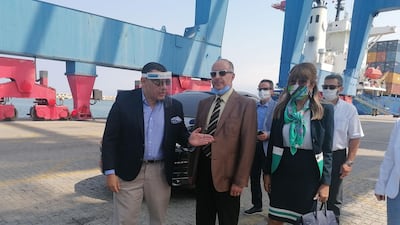A shipment of 125 tonnes of glass sent by the Federation of Egyptian Industries arrived in Beirut port on Friday to help residents of the Lebanese capital repair damage from the August 4 blast.
"We will be following in the next few days with other ships carrying aluminium, adhesive materials, marble, cement, iron and so forth," Egypt's ambassador to Lebanon Yasser Elwi told The National at the port, where he was waiting to receive the shipment along with Dany Gedeon, director general of the Lebanese industry ministry, and other officials.
The detonation of 2,750 tonnes of ammonium nitrate stored at the port shattered doors and windows for several kilometres around. At least 180 people were killed and about 6,000 wounded. According to a UN assessment, 40,000 buildings were damaged, with 3,000 residential structures seriously damaged.
Mr Elwi said Egypt had already sent 250 tonnes of medicines, medical equipment, wheat and flour, in addition to opening a field hospital that has treated 16,000 patients so far.
The glass will be stored by the Ministry of Industry and distributed in co-operation with the Lebanese army. “We have a transparent mechanism. I shall be visiting the houses of those who will have it [the glass] to make sure that they are happy and satisfied,” said Mr Elwi.
Mr Gedeon said this was the first donation of glass to be sent directly to the ministry. “We are also in contact with France, the EU, the United Nations, but there is no final answer yet,” he said.
“We do not know how much glass we need exactly but 125 tonnes are not enough to cover everything for sure.”
Several countries have sent humanitarian aid and construction material to Lebanon since the disaster. They have avoided handing it over to the government, which is accused of corruption and mismanagement. Before the blast, the country was already suffering from its worst economic crisis, with hyperinflation and a devaluation of its local currency by about 80 per cent.
During a short visit to Beirut a few days after the blast, French President Emmanuel Macron vowed to send help "directly to the people, the relief organisations and the teams that need it on the ground".
As he visited damaged neighbourhoods, people shouted out to tell him to not trust their government with aid.
Two weeks ago, the Lebanese community in the UAE sent 138 tonnes of glass to Beirut to repair more than 1,000 homes and small businesses. The shipment was expected to take several weeks.
The arrival of the ship carrying the glass donation from Egypt was delayed by a few hours on Friday because of the reduced number of cranes operating at Beirut port.
Several giant cranes were damaged by the blast, but the port is currently "100 per cent" up and running when it comes to import and export, as well as loading and unloading, port director Bassem Al Qaisi told The National earlier this week.
Because warehouses were severely damaged by the explosion, storage space is down to 40 per cent of the port’s pre-blast capacity. Some ships are being diverted to Lebanon’s second port further north in Tripoli.



































